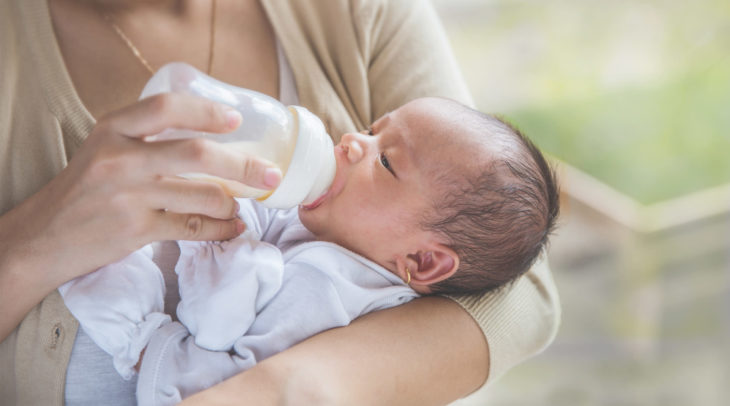When it comes to nutrition during pregnancy and nursing, one nutrient and you will hear about often is Docosahexaenoic acid (DHA).
Why is it important to get plenty of this omega-3 fatty acid while you are pregnant or breast-feeding? In this article, we will go over some of its key benefits for Baby.
But first, here is a quick tip. If you want to increase your DHA intake, consider taking a highly rated supplement like GLOW Prenatal Vitamins and Pregnancy Multivitamin by Eu Natural. Contained in this prenatal multivitamin is AquaCelle® Algal DHA along with other healthy ingredients such as Myo-Inositol, ginger, and PABA.
Now, let’s talk about how getting plenty of DHA supports Baby’s health and growth.
Contents
1. DHA supports cognitive development for baby

Source: nordicnaturals
Your baby’s developing brain benefits from DHA. Researchers have discovered that infants born to women with higher DHA status display better problem-solving abilities a year after birth.
According to some researches, it has been concluded that the levels of DHA in breast milk vary and depend significantly on the mother’s diet. Genetics also may play a role. The typical Western diet, unfortunately, usually falls short in delivering a plentiful enough supply of omega-3 fatty acids, while at the same time delivering an over-supply of omega-6 fatty acids (found in many processed foods). Many of us, including new, breastfeeding moms, have a dietary imbalance of omega-3 and omega-6 fatty acids in our diets, and may not be getting enough of the DHA and other omega-3s we need.
This emphasizes the importance of a balanced diet which is high in omega-3 fatty acids and balanced in omega-6 fatty acids. It also highlights the value of taking a prenatal multivitamin with DHA.
However, as the research mentioned, typical diets do not actually implement enough of DHA in the system of a mother which certainly is not enough for the baby. So, what does a mother have to do to provide enough of this omega-3 fatty acid to her loved one?
Well, there are multiple ways you can implement more of this acid into your body, but you will have to accept some big changes in your diet. The main way to obtain this nutrition is through fish such as anchovies, mullet, rainbow trout, Pollock, and many more. You can also start implementing shrimps, oysters, and shellfish in your diet.
Keep in mind, you won’t have to eat fish every single day, but you can at least add this type of meal once or twice in your week.
I should also mention that you should maintain this diet while you are pregnant and when breastfeeding. Your little one needs DHA as both an infant and a while in the womb to properly develop its brain.
2. Baby’s eyes benefit from DHA

Source: thebump
As explained in this article, “These [DHA and ARA] polyunsaturated omega-3 and omega-6 fatty acids are important components of the human brain and eyes and are naturally present in human breast milk.”
This article is trying to convey the fact that mothers have to implement more omega-3 rich diets during pregnancy and when breast-feeding. Although, such a diet might be more important during pregnancy to ensure that the baby’s sight will develop in the right direction.
So many children are born with bad vision, DHA deficiency in mothers might be one of the reasons. Of course, many times vision relies on genetics, but it is best to eliminate all other possibilities.
That means that getting more DHA in your diet when you are pregnant or breast-feeding is vital to help your baby’s eyes to develop properly.
3. Your baby is less likely to be born prematurely if you take DHA

Source: Natalie Parletta
This study analyzed the effects that DHA intake had on the likelihood of preterm deliveries. Based on their findings, the team reported, “Among the next 300,000 births in Australia we estimated that 1112 ePTB [early preterm births] (95% credible interval 51-2189) could be avoided by providing DHA. And in the USA we estimated that 106,030 ePTB (95% credible interval 6400 to 175,700) could be avoided with DHA.”
It is astonishing to think that hundreds of thousands of preterm births could potentially be prevented simply by increasing DHA intake. This is yet another very good reason to make sure that you are getting plenty of DHA while pregnant.
However, DHA is not a magic solution to every problem that is related to infants. There are many other factors when it comes to premature births. Life is a little bit more complicated than that. Maintaining a proper diet will be good for you and your little one, but you should also be aware and ready for the possibilities of other problems in the future.
4. DHA supports your health, which supports the baby’s health

Source: Medical News Today
Finally, studies provide evidence for a number of other possible health benefits of DHA. These include reducing your risk of heart disease, improving circulation, protecting neurological health, fighting inflammation throughout your body, and more.
Improved circulation will also lead to an increase in energy throughout the day which is exactly what you will need as a new mother. Especially after waking up several times in the night trying to get your baby to fall asleep.
By getting more DHA in your diet, you are supporting your overall health and well-being. The healthier you are, the healthier the environment you are providing for your developing child during your pregnancy. In other words, as long as you are happy and stress-free, your baby will be too and that is what is important.
Make Sure You and Baby Are Getting Your DHA
Now you know some of the impressive benefits of DHA for your developing infant. So, increase dietary sources of DHA and consider taking a prenatal multivitamin with DHA while you are pregnant and as you are nursing. Doing so may decrease the chances of preterm birth while helping your baby’s brain and eyes to develop properly.
